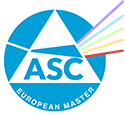Erasmus Mundus Joint Master Degree
ABOUT ASC
OBJECTIVES
The ASC EMJMD is a programme of excellence which has been awarded the Erasmus Mundus label three times since 2008. The five European universities of the ASC network offer state of the art equipment and expertise covering applications of spectroscopic techniques to chemistry in a broad sense (from material sciences, environmental sciences, biomedical/health sciences etc.). Mobility within this network prepares students to become experts and develop international skills towards doctoral studies, and/or professional industrial careers in chemical analysis and characterization of the structure of materials.

DISCOVER SPECTROSCOPY & CHEMISTRY
CHALLENGES OF MODERN CHEMISTRY
Modern chemistry is concerned with complicated materials whose properties and uses can only be understood when the materials are viewed as a whole and not merely defined in terms of component parts.
Superconductors, resins and ceramics require a true understanding of structure but not only a simple chemical analysis. Continuing developments of new composite materials for a wide range of applications in industry and medicine need ever better understanding not only of static structure but of the dynamic nature of molecular interactions.
The imitation of nature has been a dream of mankind throughout the ages and the introduction and uses of the technologies of biomimetic chemistry, nanoscience and nanotechnology are rapidly arriving at this goal. Designer substances like the additives used to improve the colour, taste and smell of food, the omnipresent nutraceuticals and engineered pharmaceuticals may indeed soon be a thing of the past as they are replaced by the molecular machines of nanotechnology which can act directly in synergy with the organism as such. Chips carrying genetic information for the production of enzymes and biocatalysts and ultimately for a range of more complicated molecular machines open undreamt of possibilities.
THE EARTH AS A SINGLE CHEMICAL SYSTEM
A clearer understanding of the world around us leads to the recognition that the earth itself should be considered as a single chemical system.
Examination of this global system is of vital importance and has led to the development of “green chemistry” as a label for environmentally more friendly chemistry.
These ongoing developments require a much improved understanding of chemical structure and action, and the ability to examine intact systems of great chemical complexity. The key to such understanding lies in a variety of spectroscopic techniques which are able to provide a true picture of molecular assemblies and small changes taking place within them. Such advanced spectroscopy must be able to operate in real time and give reports on ultra-rapid fast reactions.
A COMMON EUROPEAN ANSWER TO WORLDWIDE CHEMICAL PROBLEMS
The developments occurring within chemistry need “Urgent expansion in the following five categories”:
- High-performance instruments and measurements of unprecedented precision, sensitivity, spacial resolution and specificity.
- Low-cost robust instruments for analysing exceptionally small volumes.
- High-throughput measurements including informatics and mathematics for interpretation of large-volume data streams.
- Separation and analysis of chemical and biological mixtures of extreme complexity.
- Determining the structural arrangements of atoms within non-crystalline chemical substances and resolving how they change as a function of time.”
- This description about worldwide problems in chemistry needs to be addressed by common European answers. One of them is this program in advanced spectroscopy, offered as a full program at the participating institutions.
